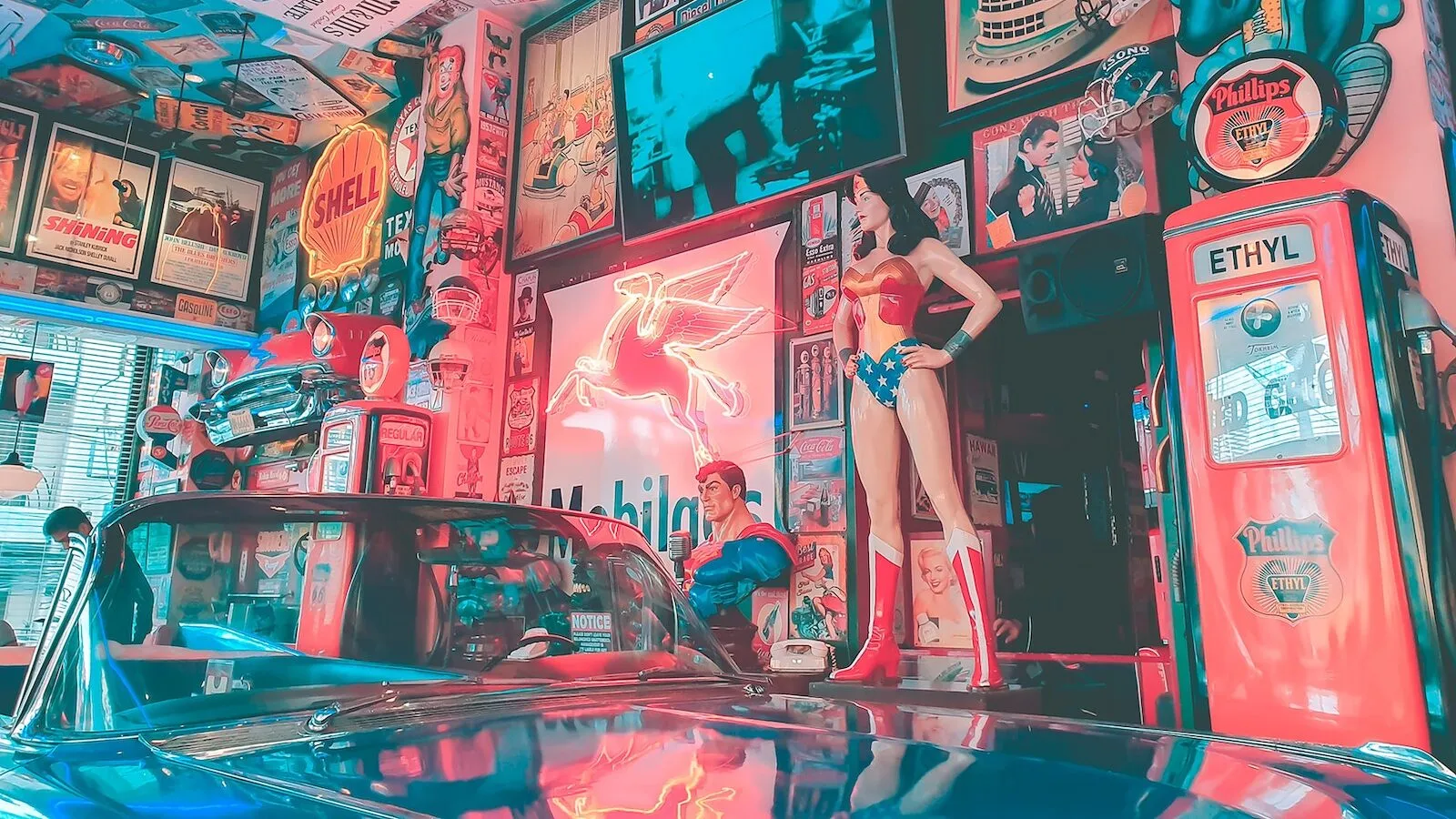In Your Satin Tights, Fighting For Your Rights: A History of Wonder Woman’s Costumes
At long last, Wonder Woman 1984 finally hit U.S. theaters and HBO Max on Christmas Day. The world’s most famous superheroine has been around for 79 years, and the new movie has me thinking about her history. Specifically, her costume history. Let’s take a look, shall we?
(A note before we get started: I’m not going to be exhaustively covering every variation in chest emblem, tiara, boot height, etc., because good lord that’s a lot. I’m also only going to touch on major multimedia appearances, and as usual I’m leaving out video games because I don’t even go here.)
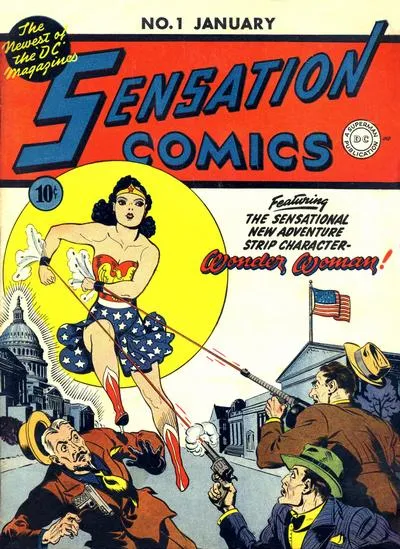
Wonder Woman debuted in All Star Comics #8 (October 1941) in a story by William Moulton Marston and H.G. Peter, before going on to headline both Sensation Comics and Wonder Woman in early 1942. Whole books can (and have been!) written about Marston’s goals with Wonder Woman and his own unconventional lifestyle, but let’s just focus on the costume, shall we?
The historical context is inescapable. Like Captain America, Wonder Woman was created during a surge of patriotic feeling, though prior to the U.S. actually entering World War II. Hence the outfit, which looks more like a chorus girl costume for an Americana-themed variety show than anything reflecting Diana’s ostensibly Greek-ish origins, from the star-spangled skirt to the golden eagle breastplate. Fun fact: the bottom half of the outfit was actually intended to be loose, blousy culottes, although it has subsequently often been drawn as a skirt instead.
I hate to admit it, but this ensemble is…kind of a mess, both semiotically and sartorially, and will remain so pretty much forever. I love it because it’s iconic and because she looks dang cute—seriously, Peter’s art is so weird and appealing—but there is so much going on. However, please take a gander at this gif from 1942’s Yankee Doodle Dandy, particularly the ladies:
If Diana was garish, at least she was on trend! And if she showed a bit more skin than her cinematic sisters, well, comics weren’t (yet) subject to the same content restrictions that movies were. Also, that curl set is *chef’s kiss*
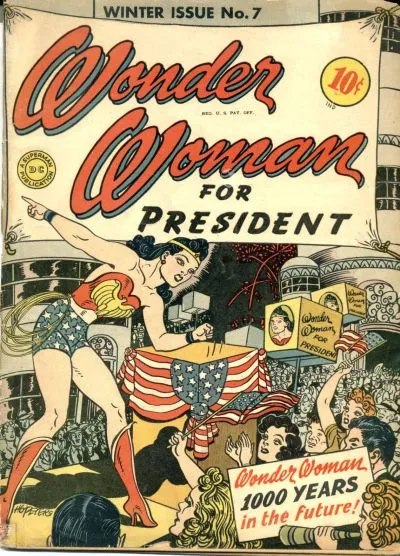
By the time she got her own series a few months later, the culottes had become the more recognizable…well, they wouldn’t have been called bike shorts then, but bike shorts. This obviously isn’t streetwear for 1942, but it does resemble bathing suits and dance costumes from the time: check out dancer Ruby Keeler’s little short-shorts, while Betty Grable’s famous WWII pin up shows off a nearly backless look that’s a little more plausible than Diana’s gravity defying ensemble.
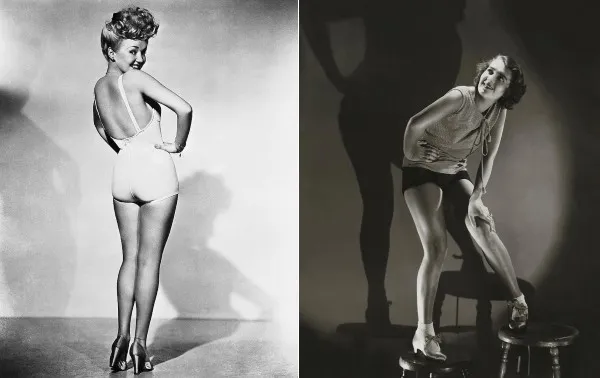
In 1949, Diana switched from boots to ballet flats, further emphasizing that dancer aesthetic. Her hair also grew significantly longer.
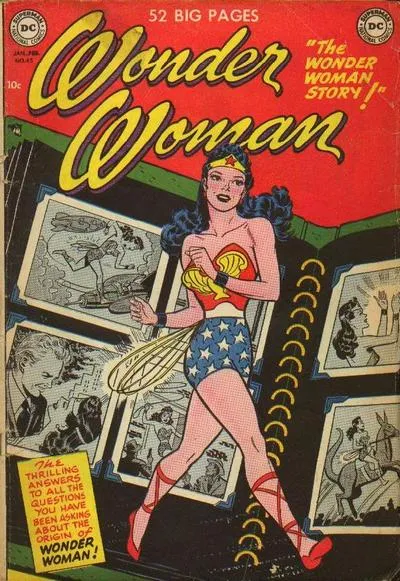
By the late ’50s, Diana’s shorts were closer to the bikini cut we’re used to, and her ballet slippers/sandal things had inexplicably developed high heels.
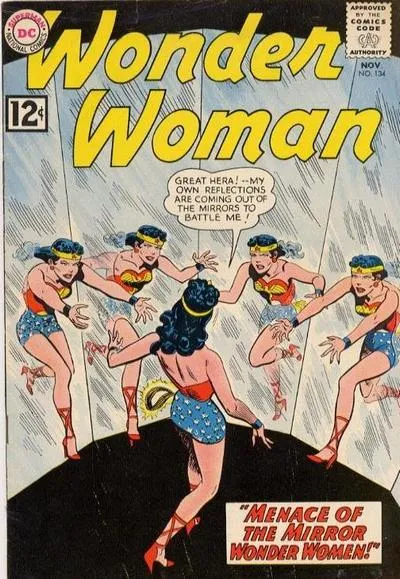
Interestingly, her costume wasn’t really affected by the onset of the Comics Code Authority. Short version, in case you’re not familiar: by the early 1950s, there was a widespread parental backlash against the violence and nihilism in comic books and their supposed negative effects on children, spurred in part by psychologist Dr. Frederic Wertham and his book Seduction of the Innocent. In response, the comics industry formed the Comics Code Authority, which granted or denied comics approval based on their adhering to its rules, which forbade anything too violent or sexy, as well as disrespect of authority and conservative social mores. When I wrote about Catwoman’s costume history earlier this year, I noted that Selina disappeared from comics for about a decade because she was too gleefully lawless for the height of the CCA. Wertham took potshots at Diana for being canonically into bondage (absolutely true) and a lesbian (borderline true? The subtext is unsubtle, even if to this day DC tends to be cagey about her bisexuality), but though the content of her comics changed to be more marriage-focused and generally far less independent of men as a whole, her look stayed the same.
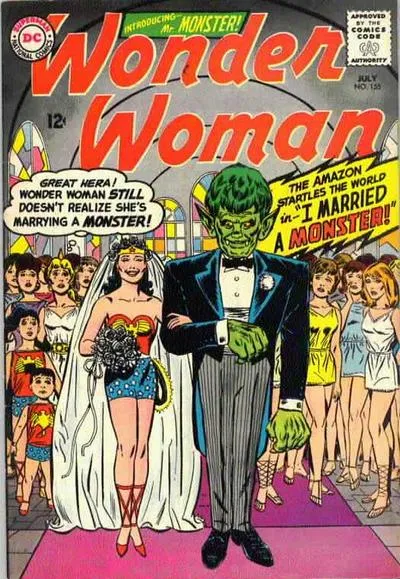
To wit, this issue of Wonder Woman from 1965, which among other things has Wonder Woman trying to cook a delicious meal for her monstrous husband because “the way to a man’s heart is through his stomach,” is simultaneously hilarious and a huge bummer—but Diana is still sporting her classic, skimpy duds. (Were the members of the Comics Code Authority all men? Probably.)
Diana finally made a shocking change in 1968 by ditching the costume entirely:
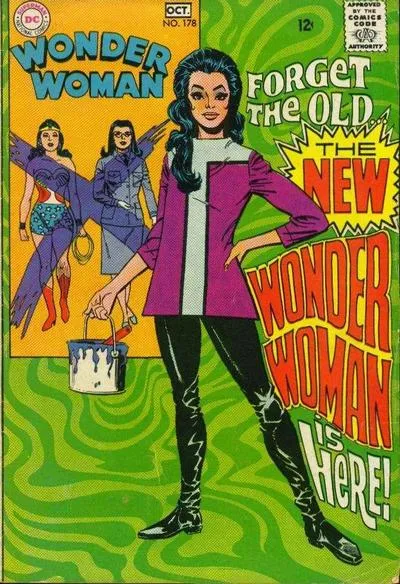
The Amazons were relocating to another dimension, and in order to stay in Man’s World with her love interest Steve Trevor, Diana had to give up her powers and her iconic costume. Naturally, she opens up a mod clothing boutique, and also learns martial arts from a mysterious blind Asian man named I Ching. Oof. This shameless trend jumping was largely inspired, of course, by the fabulous Diana Rigg as Emma Peel in The Avengers (no, not those Avengers):
I’m of two minds about this era. On the one hand, I can’t see Superman giving up his powers to travel the world in a catsuit and fashionable bouffant (more’s the pity) (and no, the terrible “Grounded” arc from 2010 is not the same thing). DC did try to tell some women’s lib–inspired stories at the time—there’s an issue where Diana protests in favor of equal pay, and a planned (but canceled) storyline where she defends an abortion clinic—but the fact that they were all written by men is just sort of condescending. Plus the I Ching stuff is every racist American kung fu movie trope at once.
On the other hand…come on, she just looks so darn cute!
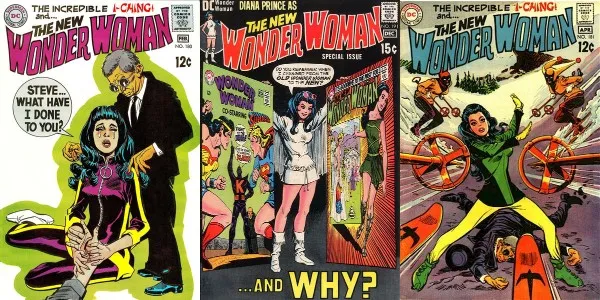
It was no less a personage than Gloria Steinem who helped Diana get back to basics, by placing her on the cover of the very first issue of Ms. Magazine—in costume—and campaigning to have Diana’s powers restored. You’ve probably seen said cover:
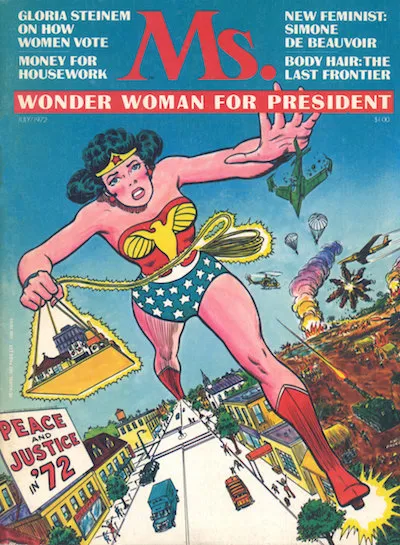
The comics promptly restored Diana’s costume and powers, but kept the big hair. She retained this updated look for 1973 Super Friends:
1974 brought Diana into live action for the first time with the television movie Wonder Woman starring Cathy Lee Crosby, which hewed closer to the no powers mod era, but with that inimitable 1970s, um, panache:
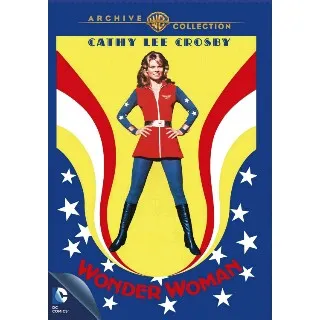
The lack of effort here is really what’s so frustrating. They couldn’t get her a black wig? I’m not opposed to giving her a costume that’s presumably more comfortable—although those tights look somewhat sheer so it’s not like she’s chilling in yoga pants—but this looks like something they’d sell in an infomercial at 2 a.m. And the boots don’t even match! Hard pass.
Despite the failure of the TV movie, ABC kept trying the following year with the now-iconic Lynda Carter show:
Now this is Wonder Woman! The tiara, the lasso, the hot pants! Looking at this costume, I’m reminded again that I have no actual ability to gauge whether or not it’s good because it’s so embedded in pop culture that it just feels right to me. Is it attractive? I don’t know. Is it feminist? I don’t know. Is it comfortable? Almost certainly not. But Lynda Carter rocked the hell out of it.
Over in the comics, Diana kept up this look, with minor variations (hair length, boot stripes, etc.) for nearly a decade. In 1982, she got a bit of an update with a new emblem:
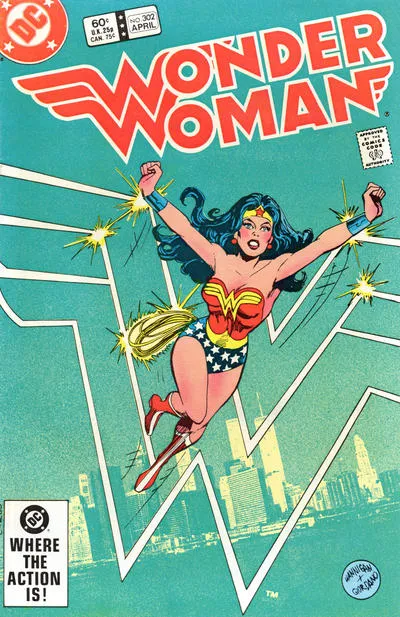
Gone was the stylized eagle that had been in place since 1941, replaced with a stacked double W which Diana was canonically iffy about until she realized it could stand for all women. Uh, sure.
In 1986, the whole franchise got an overhaul in the wake of Crisis on Infinite Earths, and Diana was reintroduced to Man’s World:
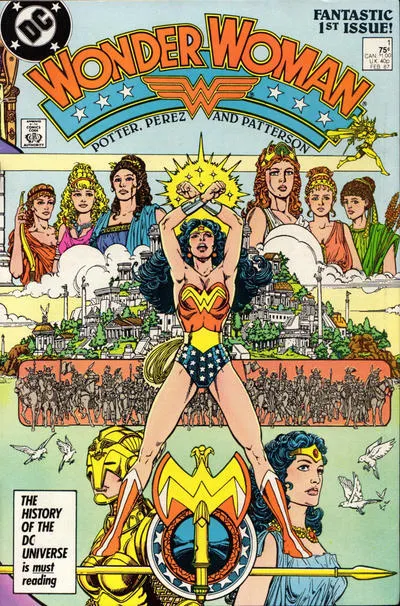
The costume is fundamentally the same, but the hair, as befits the ’80s, is absolutely enormous. Please also note that the bracelets have become bracers, and the boots, while not exactly flats, have lost their spike heels. I’m into it!
In 1993, we almost got something amazing:
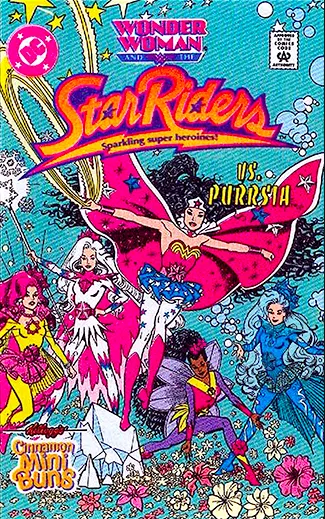
Wonder Woman and the Star Riders was a promotional comic distributed in Kelloggs cereal boxes to drum up excitement for a toy line and cartoon that were never actually produced. As someone who was a little girl in 1993, I feel profoundly cheated that I never had the opportunity for beg for this garish hideousness for Hanukkah. Diana’s outfit is awful (as are her friends’), but it’s awful in that sublime Jem and the Holograms/Rainbow Brite/original She-Ra way that little girls love, and thus it is actually perfect. If only, Wonder Woman and the Star Riders. If only.
Meanwhile the comic was very much not for little girls. I’ll give you three guesses who it was for, and the first two don’t count:
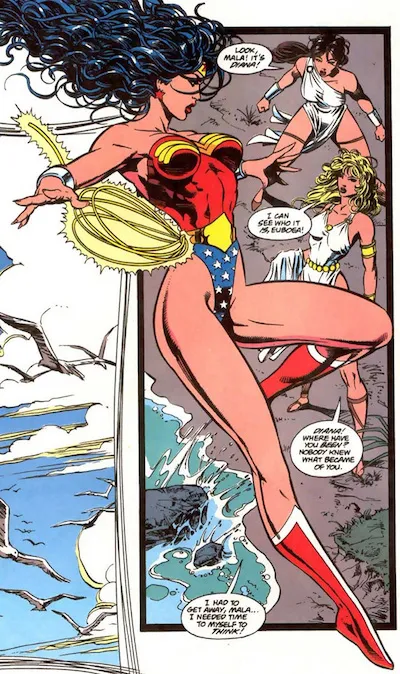
Oh, we’re in the ’90s now, folks! Artist Mike Deodato Jr. just went ahead and cut the briefs into a thong, saying “Every time the bikini was smaller, the sales get higher.” Truly, by exposing two-thirds of Diana’s pubic area, DC had captured Marston’s vision of creating a strong role model little girls could look up to.
All that said, the thong might have been better than what came next:
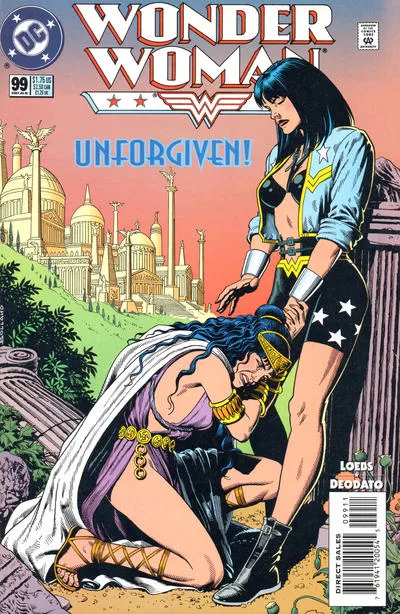
Now these are bike shorts! I mean, this is just hideous. The bra is lazy, the weird little bondage-y straps across her belly are so noncommittal Marston is rolling in his grave, and the jacket actively looks cheap. Even Brian Bolland, who designed it, didn’t like it. I will say that there’s a certain level of realism here, in that it looks like a bad ’90s outfit that a human being would wear rather than a comics take on a bad ’90s outfit (note the dearth of pouches), but that’s not really a compliment. The only saving grace is that it lasted less than a year.
But hey, at least we get to see wonder woman’s mom’s pelvic crease. 😐
Diana quickly returned to a variation on her classic costume! Hooray!
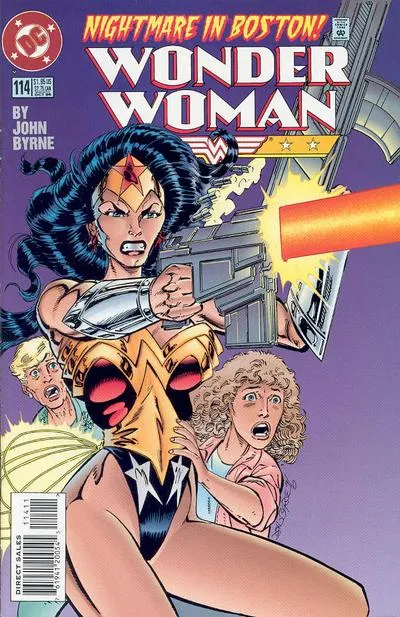
…Sigh.
(If you can look away from whatever the hell is happening to her whole lower region there, you’ll note that the breastplate of the costume now covers her stomach as well.)
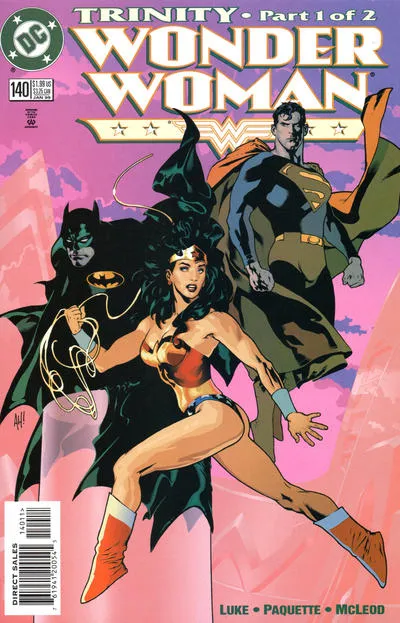
As we neared the end of the millennium, the bikini became a clear thong again, but, uh, at least the boots are slouchy? Apparently this was controversial. Not that her whole bottom is out. The boot thing. Please see above, re: “Sigh.”
Meanwhile, Diana returned to the small screen in 2001’s Justice League and its sequel series, Justice League Unlimited:
This is basically a simplified version of the classic look, and as such it works well. I could do without the heels, but generally speaking I have no complaints here.
She got her own animated movie in 2009, and finally got rid of the heels:
Back in the comics, things puttered along until 2010, when we got a really controversial costume, designed by Jim Lee.
Okay. Let’s talk about the pants.
Many people of all genders have argued for decades that Wonder Woman (and Supergirl, and Elektra, and any number of other iconic heroines) should get pants. Male heroes don’t typically run around in their underwear, so what possible reason could there be for Diana to wear so little clothing other than cheesecake? Well, besides “She’s always dressed like that.”
First of all, I’d like to defend the “She’s always dressed like that” argument. I’ve said a couple of times in this article that I can’t actually evaluate whether or not the iconic Wonder Woman costume is any good because it’s so iconic. My brain just goes “Ah yes, that’s correct.” She’s sported some variation on it for the better part of eight decades, which speaks to some serious staying power. And yet Wonder Woman has been subjected to more costume fiddling—and, not for nothing, more reboots—than either Superman or Batman, as DC (and fans) try repeatedly to “fix” her. Could it be possible that when a character is the most famous superheroine in the world and has been for nearly a century, she doesn’t actually need to be fixed?
I also have read far too many comics to believe that pants = non-exploitative art. For example, take a look at these two pieces of published art:
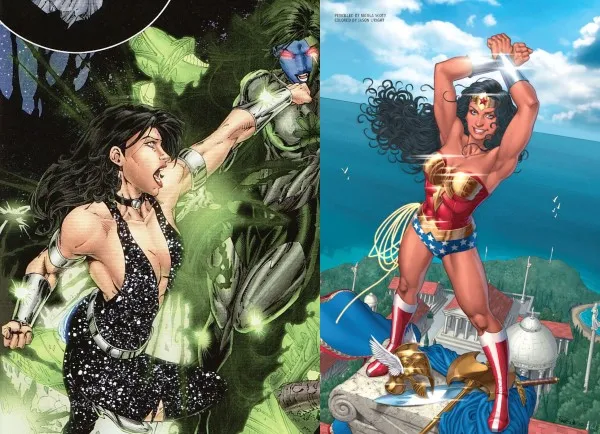
On the left, we have the original Wonder Girl, Donna Troy, as drawn by Brett Booth. She’s wearing pants…but her top is also cut down to her navel, barely containing her breasts, and her body is painfully contorted to show us her butt at the same time. And the pants are shredded to show a cheeky bit of thigh anyway.
On the right, we have Diana as drawn by Nicola Scott. She’s wearing the classic strapless, pantsless costume, but she looks strong and confident, with believable anatomy and no sense that anything might suddenly pop out for the delight of the male gaze.
The issue isn’t pants or no pants. The issue is whether or not the artist draws the character like women just might be a kind of people.
All that said, I’m not stringently opposed to Wonder Woman getting pants, as long as they’re good pants. Some characters who were famous for booty shorts have made the switch to great effect, Captain Marvel being the first to come to mind. So are these good pants?
Here’s another image, in case you forgot after all my monologuing:
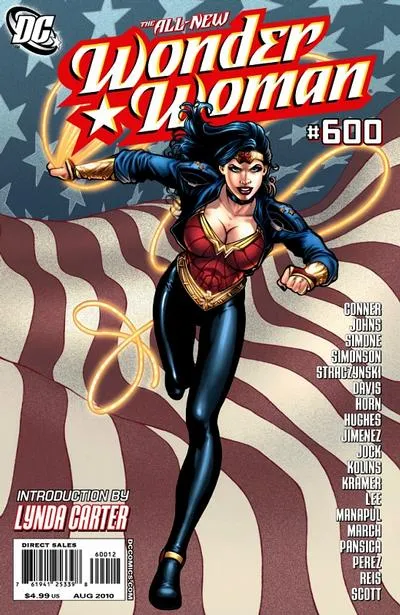
Yep, that’s pretty much what I was talking about. This isn’t anywhere near as egregious as a lot of published cheesecake art I’ve seen, but it’s still a cover centered entirely around Diana’s cleavage. I do not feel significantly more empowered by this than I did when she had the bikini bottoms.
Otherwise…Well, this costume is a mess while still somehow managing to be profoundly boring. The tiny jacket is incredibly dated, but that’s not going to stop Jim Lee putting them on everyone, all the time. The choker is also dated, but from a different era entirely. The shirt and belt and gauntlets are unnecessarily detailed and fussy in three entirely different ways, and then you get to the pants and it’s just an unbroken field of black that’s also vinyl for some reason? (And why black instead of blue?) For a new look (designed by a man) that was supposed to kick off a new, extra-super-duper feminist era for Wonder Woman (with a male writer and penciller, obviously), this is deeply uninspired.
It’s anyone’s guess how long the pants would have lasted in the comics if the New 52 hadn’t come along and shaken things up, but, well, it did. In 2011, Wonder Woman was rebooted (again) and went back to something more traditional:
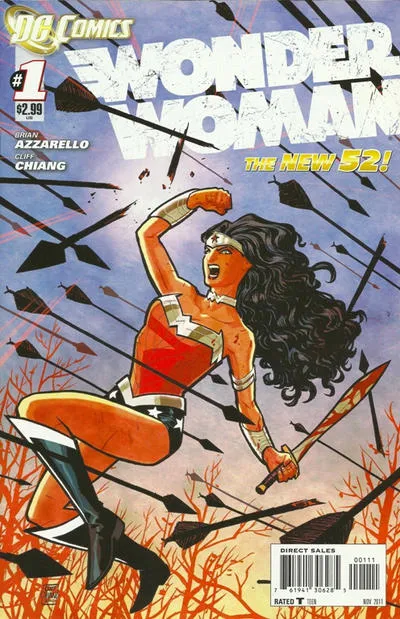
This is pretty good! It’s helped, of course, by the fact that much of Diana’s New 52 run was drawn by Cliff Chiang, whose strong sense of design and respect for the female figure shines through in all of his work. This is basically the classic look but retaining the inexplicable 2010 choker, and with the muted palette and fiddly extra lines that were the New 52’s signature. But Chang even manages to make those lines look structural instead of fiddly. Well done!
…And then the pants returned.
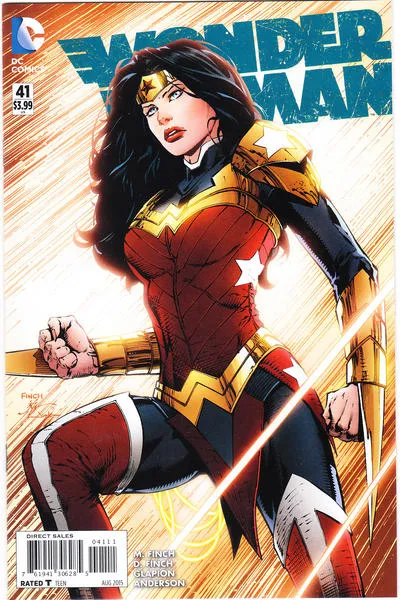
I have a lot of questions about this one, starting with “Why does she have a big red V over her vagina?” and going from there. I mean, this is just embarrassing. At its core, it essentially looks like she’s wearing thermal underwear under her costume…except that doesn’t explain the goofy wrist spikes, the uncomfortable-looking and movement-restricting epaulets, the hip pennants, or the armpit stars. And just to further underscore my point that pants on their own don’t equal empowerment, this look was brought to us by David Finch, who upon taking over the book declared that he didn’t want her to be a feminist.
You know what pants I do like for Diana, though?
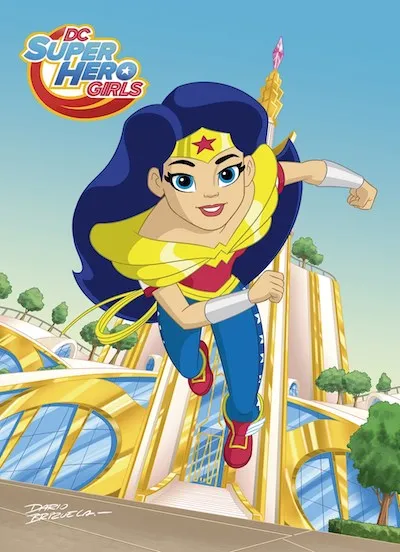
These, from the 2015 iteration of the DC Super Hero Girls franchise. This is basically the Adrienne Palicki costume, especially the bright blue pants with the stars down the sides, but with sleeves, a big wing emblem on the chest and wings on the boots, and, you know, not painfully undersized for “sexy” purposes. It’s basically hideous, but I love it because it is exactly what a 5-year-old girl would think is beautiful, and that’s the target audience for this franchise. It’s Wonder Woman and the Star Riders all over again! Baby Diana, you are tacky as hell and that is precious to me.
In 2016, Wonder Woman finally made it to the big screen in Batman v. Superman: Dawn of Justice. This movie has the distinct honor of being one of the worst I’ve ever seen, but let’s ignore…everything about it, and just talk about her costume:
First, let’s address the elephant in the room: it’s brown. It’s muddy, and depressing, and brown, but everything in Zack Snyder’s movies is muddy and depressing and brown. Plus, set photos show that the IRL colors of the costume were much closer to how they appear in Wonder Woman and Justice League, so let’s set that aside for now.
Mostly? I love this. It’s actually the correct size, which you wouldn’t think would be such a big win but apparently has to be taken into consideration. The bodice offers actual support. The leather skirt makes it look more Greek (I mean, it’s completely historically inaccurate, but it conveys the vibe, you know?) and offers marginally more coverage. The eagle and gauntlets look dope.
Look, I’m not saying there aren’t issues—the molded breast cups (a good way to guide your opponent’s blade into your heart), the four inch heels (but at least they’re chunky and not stilettos), the loose hair whipping around in her face. It’s still essentially a strapless bathing suit constructed for the male gaze. But it’s also pretty boss.
Let’s see it in color!
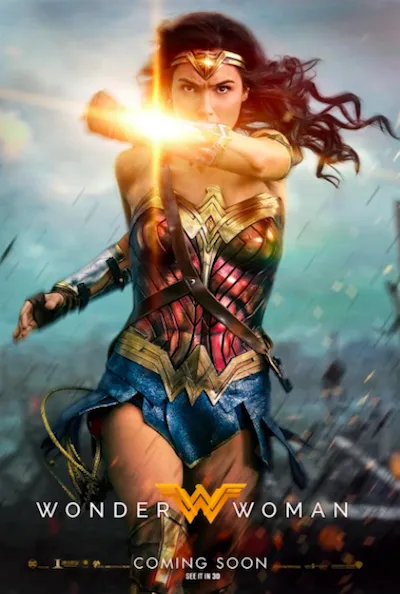
SHE’S WONDER WOMAN AND SHE’S BEAUTIFUL AND SHE CAN PUNCH A TANK. I’m sorry, but Wonder Woman (2017) still fills me with so much joy and my analytical brain shuts off. It’s not perfect, but like. It’s perfect.
The comics quickly adopted a more colorful variation on this look for 2016’s Rebirth:
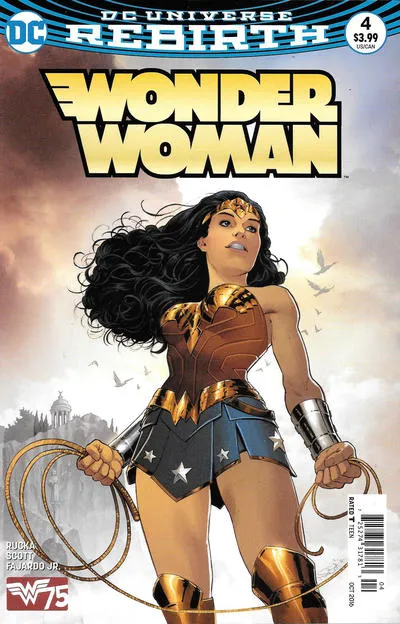
I love it. I love the brightness of the colors (because comics!), I love the skirt with the stars, I love all of it. She looks like the iconic Wonder Woman, but she looks modern and tough and comfortable too. It makes me so happy.
Her next animated outing, in Justice League Action, basically stuck with this look…
…but added heels for some reason. (Also, weird spiky hair.) Sigh.
The direct-to-video Wonder Woman: Bloodlines both did and didn’t follow this pattern, giving Diana two costumes:
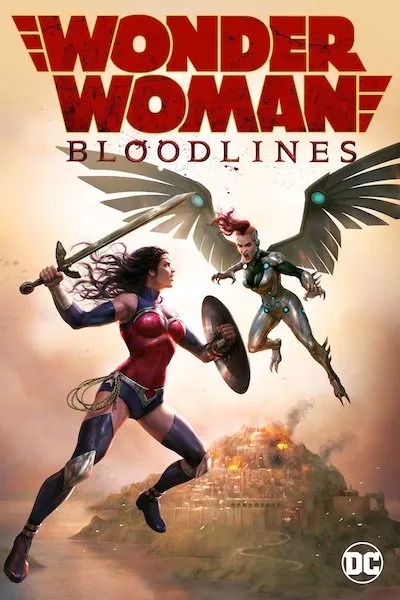
The first is basically her current/movie look, plus a lot more gold. The second is…kind of strange? Like, it looks like it would be worn by a pastiche character named “Wondrous Woman” in a Justice League parody. Or like the Finch costume with random pieces cut out of it. I don’t understand the arm warmers or how those pointy boot tops stay up? It’s just very confusing.
The rebooted DC Super Hero Girls franchise, meanwhile, stuck closer to the new comics look:
I LOVE. Okay, yes, the spiky epaulets and kneepads and enormous earrings are very silly and a good way to put your eye out, but the skirt! The actual straps holding her costume up oh my god. It’s streamlined, it’s marginally practical, it’s adorable. Lauren Faust does it again.
Which brings us to our newest look, Wonder Woman 1984:
This is functionally the same costume Diana wore in her previous DCEU outings, but in keeping with the ’80s setting, she’s traded muted sepia tones for intensely saturated primary colors. I adore it. Let superheroes wear bright colors!!! (Ahem, Mr. Snyder.)
She also sports another combat look that got a lot of attention when it first appeared in a trailer 473 months ago, before the pandemic:
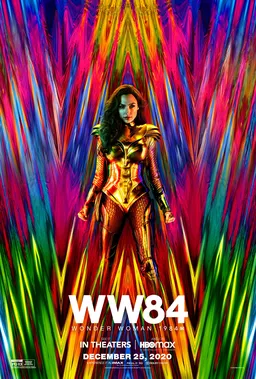
As armor, this is very silly (again, molded breastplates are a bad idea). As a costume on the ludicrously stunning Gal Gadot, it looks dope as hell. It’s presumably inspired by the armor known affectionately (?) to fans as “the Golden Chicken,” which Diana first wore in the classic alternate future story Kingdom Come and which was later introduced into the main continuity:
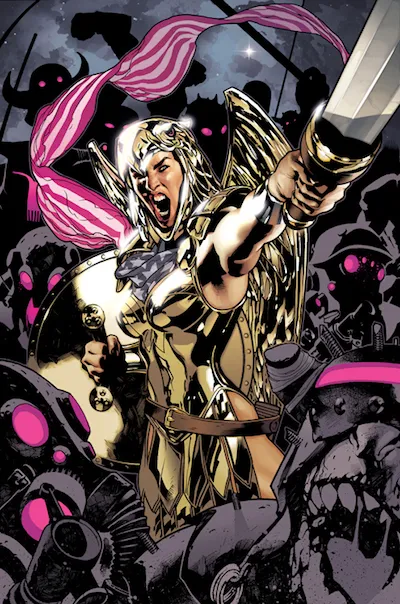
The movie version is obviously quite a bit different—it’s less avian, for starters, and it has pants and sleeves. Honestly, it looks less awkward and hard to move in than the comics version, which is weird since there’s a real living woman (partially CGIed) in there. But it’s a cool look, and I’m excited for Diana to inevitably don it in the third act of the movie for some epic ass-kicking. Maybe she’ll punch a tank again!
So there we have it: 80 years of Wonder Woman costumes. Like so many characters in pop culture who are either female or aimed at women and girls or both, she has been subjected to endless debate, scorn, hand-wringing, and reimaginings, and her wardrobe choices have been a huge part of that. And as I’ve said a few times now, I couldn’t tell you if the classic Wonder Woman costume, with all of its variations, is actually any good.
But there is something to be said for a costume that’s so baked into the DNA of our pop culture that it’s no longer possible to be objective about it. And Wonder Woman herself, despite the endless fretting, has also remained present, relevant, and beloved for nearly a century. How many characters can say that?
Thanks for the past 80 years, Diana. I can’t wait to see what you do next.
